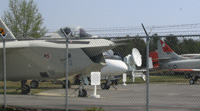|
|
|
|
Politics
|
|
Navy Is
Home for Good, Pax River Residents Believe
By Sarah Abruzzese
LEXINGTON PARK, Md.
- Patuxent River Naval Air Museum bristles with Navy achievements
past -- powerful jets, including the joint strike fighter concept planes
X-32B and X-35C -- all maintained by the Navy and berthed just a stone's
throw away at the Patuxent River Naval Air Station.
But Pax River, as the base is known,
represents the Navy's future.
Behind the base gates, said L.F. "Gus" Eggert, a retired rear admiral and
president of the museum association, is "the one stop for aircraft and
aircraft system research, development, test and evaluation . . . It is all
done here. This is a national asset."
The museum, which displays what once were the Navy's greatest aircraft and
which hopes to display its future achievements, is so optimistic about the
base's future that, with the county and state, it is building a new home.
"I certainly don't believe the base will close," Eggert said.
His museum is housed in temporary quarters, a low-slung building attached
to a large, cavernous warehouse. The association is planning a bigger
facility in front of its current site because its old home was demolished
when the county widened Route 235, which runs parallel to the base. Pax River has benefited from base closures before. It was commissioned in 1943, when five bases closed.
Then
in the 1990s, BRAC restructuring brought more units to the base, like the
Naval Air Systems Command, which moved to Pax River from Arlington, Va.,
in 1996. Major facilities were consolidated at the time, like the Naval
Aviation Research, Development, Test and Evaluation unit from Warminster,
Pa., and Trenton, N.J.
"No," said T.L. "Toby" van Esselstyn,
the museum's director, about the possibility of the base closing. "In
their infinite wisdom they have moved things here. . . . Roughly one third
of all astronauts have gone through the (test) pilot school at Pax River."
A lot of businesses sprang up after
the last BRAC realignment when multiple other installations were closed
and the activities were transferred to Pax River. The businesses are evidence of the economic symbiosis created by military installations.
"The economic base of the community has really been defense technology,"
said John Savich the director of economic and community development for
St. Mary's County. "I say that because it is not just a military base, it
is a technology base for the Navy with a lot of private-sector firms
outside the base that work with the Navy." Pax River is the largest employer in St. Mary's County. Its workers travel from as far away as Virginia, but most live in St. Mary's and nearby Charles and Calvert counties.
"It would be astonishing if the Department of Defense decided to close
it," Savich said. Inside the base, a hangar was just completed to house the evaluation of a new presidential helicopter. The new strike fighter and Multi-Mission Maritime Aircraft, or MMA, are coming.
The base has the ability to manufacture any part and it sports multiple
laboratories that test everything from the composition of paint to impact
studies from crashes. There is a tower that monitors flights, recording
every aspect of the test and presenting the client with results.
The museum shows off a 25-year
collection of Navy innovation -- a tradition that's unlikely to go
anywhere else. "The impact would really be countywide and region-wide," Savich said. "It is a bigger part of the state economy than the Port of Baltimore, $3 billion in statewide economic impact, just from Pax. Since the base has been there it has been a really big part of the community." Copyright ©
2005 University of
Maryland Philip Merrill College of Journalism
|


